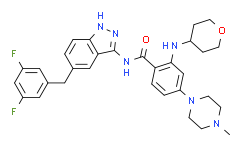| Description: |
Entrectinib is a potent and orally available Trk, ROS1, and ALK inhibitor; inhibits TrkA, TrkB, TrkC, ROS1 and ALK with IC50 values of 1, 3, 5, 12 and 7 nM, respectively. |
| In Vivo: |
Oral administration of entrectinib to tumor-bearing mice induces regression in relevant human xenograft tumors, including the TRKA-dependent colorectal carcinoma KM12, ROS1-driven tumors, and several ALK-dependent models of different tissue origins, including a model of brain-localized lung cancer metastasis[1]. Single agent therapy results in significant tumor growth inhibition in animals treated with entrectinib compared to control animals[2]. |
| In Vitro: |
Entrectinib is found to be exquisitely active in inhibiting the proliferation of a limited number of cell lines: the TRKA-driven colorectal carcinoma cell line KM12 (IC50 of 17 nM), the ALK-dependent ALCL cell lines SU-DHL-1, Karpas-299, SUP-M2 and SR-786 (IC50 of 20, 31, 41, and 81 nM, respectively), the ALK-dependent NSCLC cell line NCI-H2228 (IC50 of 68 nM) and the FLT3-dependent AML cell line MV-4-11 (IC50 of 81 nM). Entrectinib potently blocks proliferation of Ba/F3-TEL-TRKB (IC50 of 2.9 nM), Ba/F3-TEL-TRKC (IC50 of 3.3 nM), and Ba/F3-TEL-ROS1 (IC50 of 5.3 nM) cells, with a high degree of selectivity versus parental Ba/F3 cells or those transformed by nontargeted kinases such as ABL and RET, which are inhibited with IC50s in the range of 2 to 3 μM[1]. Entrectinib significantly inhibits the growth of TrkB-expressing NB cells in vitro, and it significantly enhances the growth inhibition of Irino-TMZ when used in combination[2]. |






















